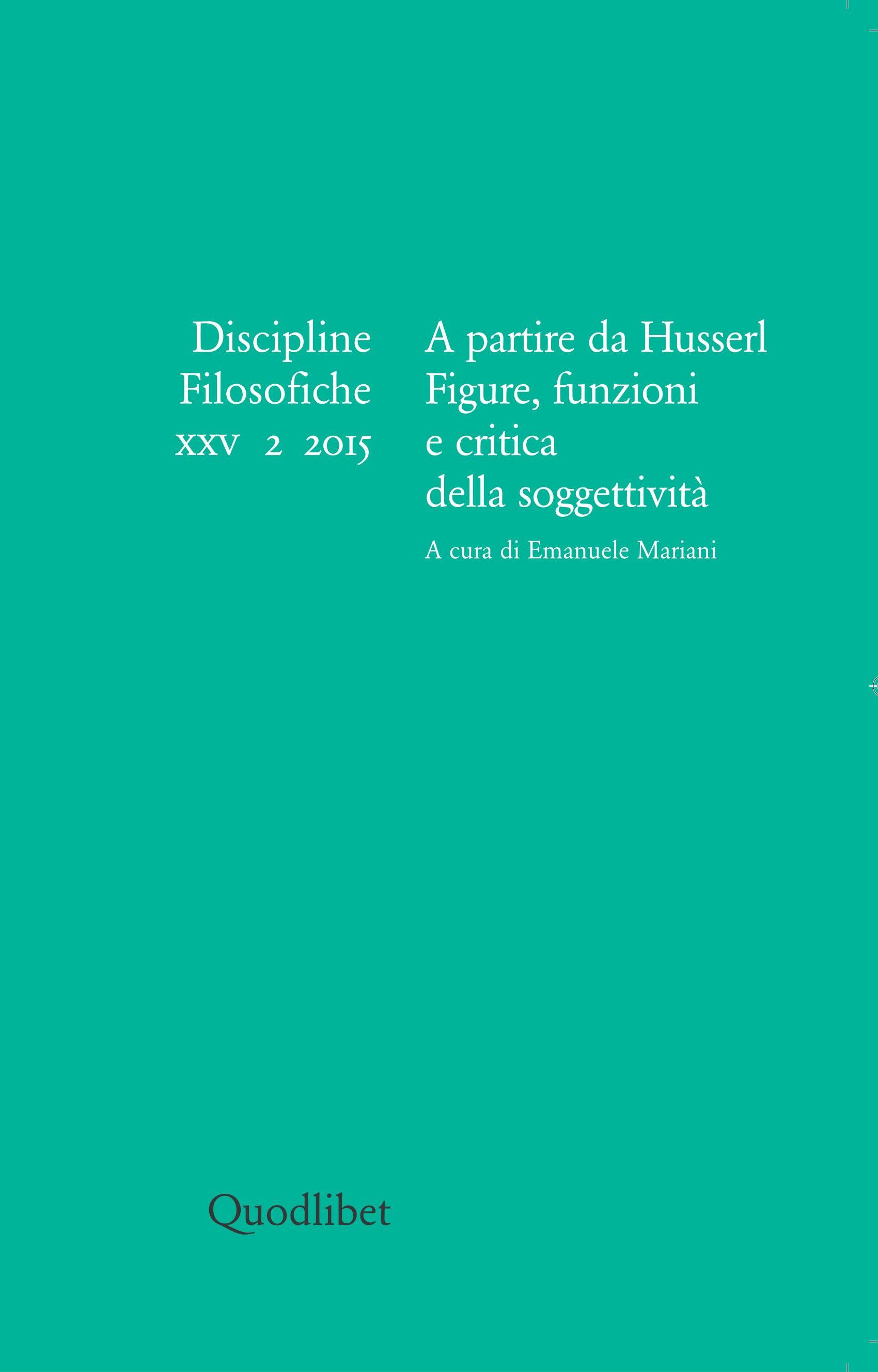 Discipline Filosofiche XXV, 2, 2015:
Discipline Filosofiche XXV, 2, 2015:
Starting from Husserl. Figures, Functions and Critique of Subjectivity
Edited by Emanuele Mariani
In order to grasp at once the significance of the subjectivity issue in the current philosophical debate a Cartesian plane could be drawn up starting from Husserl’s phenomenology, unfolding through conceptually heterogeneous fields, through grammars of thought opposed to each other, if not altogether irreconcilable. Along the horizontal axis, the internal evolution of the phenomenological movement is to be placed, first as a result of Heidegger’s reception that has basically determined the sense of a wide-spread interpretation focused on the need for overcoming metaphysics. This has notoriously led to “reversed” forms of phenomenology that pushing Husserl’s thought to the limit, have conceived of subjectivity in accordance with some other presumably more fundamental aspects, such as the “given”, the “appeal”, the “body” or the “flesh”. This multifaceted set of approaches has been accompanied by the refinement of the exegesis, which has allowed a re-contextualization of phenomenology into a long term history, combining the Heideggerian “deconstruction” methodology with the project of a “philosophical archeology”. At the other end of the spectrum, the analytically inspired philosophy of mind that can be found. Here, for a whole other reason a “return to subjectivity” took place, due to the change of paradigm in force in the broader domain of the cognitive sciences which searched for an analysis able to account for the “first person perspective experience” –an analysis increasingly sensitive to the outcomes of the phenomenological legacy. Along the vertical axis, another opposition appears which embraces the individual and collective forms of subjectivity: from the encounter of phenomenology with psychology, psychoanalysis and psychopathology, to a reflection on normativity, social world and “practices” –as Foucault would conceive of them– which has casted a new light on the convergence between phenomenology and anthropological philosophy.
Such, in brief, are the facts of the matter that we wished to make explicit in this issue of Discipline Filosofiche: from the history of metaphysics to the positive sciences, from ethos to pathos, from continental to analytical philosophy. Subjectivity is of universal significance, and even more universal if we take into consideration its geography: from Leuven to Copenhagen, from Canberra to Tucson in Arizona, subjectivity is no longer just the name of a problem, but the title of a multidisciplinary research program that benefits from a widespread institutionalization. The task of its general reconnaissance is therefore urgently needed, considering Husserl as the ideal point of departure, and not of return, in order to face the risk of dispersion to which the concept gets exposed. It is worth mentioning in this regard a recommendation from Jean-Luc Nancy, formulated as guest editor almost thirty years ago for another journal on the occasion of a special issue suggestively entitled “Après le sujet qui vient”: a recommendation that conceived of subjectivity as the very possibility of our being-in-the-world. More than a concept, it is therefore a family of concepts that has to be understood, whose affinity would eventually emerge at the light of the internal and external mutations that determine its thematic fields and its related problems such as, for instance, intentionality, consciousness, self-consciousness, reflection, first person perspective –the concrete problems through which time after time the different figures of subjectivity appear. It is neither a death sentence then, or – to put it more modestly – a return: “after the subject”, as a result of Nancy’s recommendation, we would invoke nothing but the scope to reconsider anew the figures, to analyze the functions and reactivate, to say it with our words, the critique of subjectivity.
Contents
(click on the titles to view the abstracts)
Emanuele Mariani, Presentazione
Dermot Moran, Husserl on Human Subjects as Sense-Givers and Sense-Apprehenders in a World of Significance
Dominique Pradelle, De Husserl à Heidegger : intentionnalité, monde et sens
Pierre-Jean Renaudie, Dire et penser “je” : La vacuité de la présence à soi du sujet de Husserl à Derrida
Julien Farges, Réflexivité et scission originaire du sujet chez Husserl
Jean-Sébastien Hardy, La “lutte pour la vie et la mort” : les fondements affectifs de la conflictualité chez Husserl
Elisa Magrì, Subjectivity and Empathy: A Steinian Approach
Pedro M.S. Alves, Self-consciousness and Intentionality. A Reappraisal of Brentano’s and Rosenthal’s Theses
Abbed Kanoor, Leben und Zeit. Zu Hans Blumenbergs kritischer Auseinandersetzung mit der Zeitphänomenologie Husserls
Andrea Angelini, Filosofia del concetto e soggettività. Jean Cavaillès tra fenomenologia e dialettica
Karel Novotný, Renversements de l’intentionnalité : Jean-Luc Marion et la mise en question de la subjectivité de l’apparaître
Nicolas de Warren, Husserl’s Cartesianism, anew

 Italiano
Italiano


